21aug
EMCC AND OTHER MISSISSIPPI COMMUNITY COLLEGES PROVIDE PATH TO UPWARD MOBILITY, SUPPORT
ECONOMIC GROWTH AND GENERATE REVENUES
News
August 21, 2025
Crawford resident Matthew Davis is a typical Mississippi community college student
in that he attends the college nearest his home and hopes to stay in the area after
he graduates.
“I want a good career that lets me stay as close to home as possible,” said Davis,
who is entering his sophomore year at East Mississippi Community College’s Communiversity,
where credit and noncredit programs that lead to careers in advanced manufacturing
are taught. “I chose EMCC because I knew I could get a good education in a field that
pays well and finish school in half the time and half the cost of a four-year degree.”
Davis is enrolled in EMCC’s Precision Manufacturing and Machining program, which offers
state-of-the-art training that prepares students for careers as machinists, computer
numerical control, or CNC, programmers and operators, as well as tool-and-die makers.
“I really would like to work for one of our local factories as a CNC machinist,” Davis
said of the field in which operators use computers to control the movement of shop
equipment such as lathes and milling machines.
On average, Mississippi community college graduates are earning substantially more
than their counterparts with only a high school diploma, which in turn generates additional
tax revenue for local and state governments.
“A large percentage of jobs in Mississippi that pay good wages require more than a
high school diploma, but less than a four-year degree,” EMCC President Dr. Scott Alsobrooks
said. “That is certainly true in our area of the Golden Triangle, which has an ongoing
need for employees in fields like health care, information technology and advanced
manufacturing. We make a point to work with our local industries to ensure the programs
we offer meet their needs for a skilled workforce. That benefits businesses and our
students, as well as the communities we serve.”
EMCC serves as a conduit between those in search of a career and employers in need
of a skilled workforce. In the 2024 academic year, EMCC served more than 5,100 for-credit
students and 1,200 workforce trainees, according to a study commissioned by the Mississippi
Association of Community Colleges.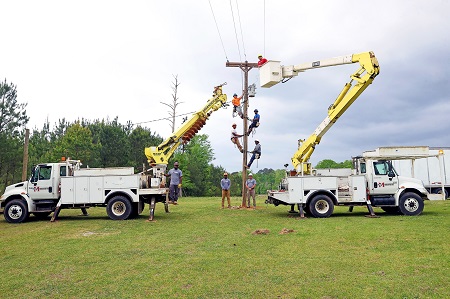
Most EMCC graduates who earned a certificate or associate degree remained in Mississippi,
with nearly 83 percent of them either securing employment or continuing their education
at a Mississippi university, according to the study.
Conducted by the National Strategic Planning & Analysis Research Center, or NSPARC,
at Mississippi State University, the study commissioned by the Mississippi Association
of Community Colleges revealed that 91 percent of EMCC’s students were from in-state,
with 66 percent of those residing in the college’s district, which is comprised of
Clay, Kemper, Lauderdale, Lowndes, Oktibbeha and Noxubee counties.
EMCC’s Workforce Services Division works closely with area industries on program curricula
in career technical fields and advanced manufacturing programs at The Communiversity.
Some industries provide internships to EMCC students in their areas of study.
During the first week of August, EMCC Electrical Technology student Eli Kemp was offered
a paid internship with benefits at Steel Dynamics’ biocarbon production facility in
Columbus.
“I will be paid while I am in class at EMCC and will then go to work where I will
be on the clock,” said Kemp, who this fall segued into EMCC’s Mechatronics Technology
program, which trains students for careers as multi-craft technicians in the areas
of mechanical engineering, electrical engineering and control systems.
“I will be performing electrical maintenance tasks, troubleshooting and working on
electrical controls. Basically, my job will be to locate the source of any problems
that come up and fix them,” he said.
Kemp, who is originally from Kosciusko but now resides in Starkville, said he will
serve in the internship for two years and, as part of the agreement, will stay at
Steel Dynamics for at least another three years as part of his contract.
“I hope to stay in the area and make a career at Steel Dynamics,” Kemp said. “I live
in an apartment now, but once I graduate, I want to find a place out in the country.”
Graduates who stay close to home for work are a boon for Mississippi and the local
economy.
In fiscal year 2024, EMCC spent more than $47 million on statewide operations, including
employee salaries, contractual services, capital purchases and scholarships, among
other things. The study estimates that students at EMCC pumped an additional $30 million
into the economy in the form of $18 million in goods and services and $12 million
in off-campus living.
What the study does not capture is the economic impact of the countless number of
students who graduated from EMCC since its founding in 1927 who stayed in the region
and launched successful careers.
One such example is that of Starkville resident Justin Lindley who parleyed his time
in the Welding Technology program at EMCC in 2006-07 into three successful businesses
he owns and operates today: The Welding Works, True Grit Trailers and True Grit Trading
Company.
Lindley employs, on average, more than 15 people in his three businesses, with about
half of those graduates of EMCC’s Welding Technology program.
“Welding has been a good field for me and I credit a lot of that to EMCC and my welding
instructor, Gary Gammill,” Lindley said.
Each year, a new crop of EMCC students joins the workforce.
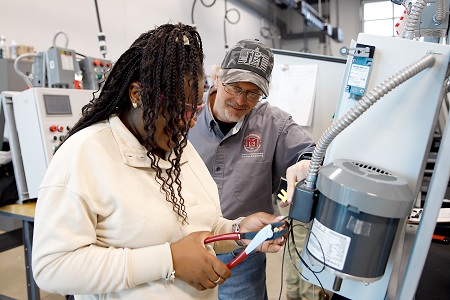 During the 2024 academic year, EMCC awarded a total of 921 certificates and degrees.
Of those, 478 were Associate of Art degrees, with 208 Associate of Applied Science
degrees awarded and 235 students earning one-year certificates.
During the 2024 academic year, EMCC awarded a total of 921 certificates and degrees.
Of those, 478 were Associate of Art degrees, with 208 Associate of Applied Science
degrees awarded and 235 students earning one-year certificates.
The top programs leading to a degree included those in the health professions, followed
by business, management and marketing, and liberal arts and sciences, which includes
general studies and humanities. Other popular fields of study include engineering
technologies and computer and information sciences.
Health professions also topped the list of career technical certificate programs at
EMCC, which was followed by precision production, personal and culinary services,
construction trades, and mechanic and repair technologies.
To keep up with the demand for employees in the health care industry, EMCC added an
Associate Degree Nursing program on the Scooba campus, with the inaugural class beginning
during the fall term that starts later this month. The college doubled the number
of Associate Degree Nursing students on the Golden Triangle campus in 2023 and reinstated
the Practical Nursing program on the Scooba campus in 2022 after a 19-year hiatus.
“There is a need for additional employees in all sectors of the health care industry
both locally and nationally and we want to ensure we are doing our part to meet those
needs while providing a quality education to our students,” EMCC Vice President of
Instruction Dr. James Rush said.
Mathiston resident Dennisia Batts completed EMCC’s Practical Nursing program in 2020
and returned to enroll in the Associate Degree Nursing LPN to RN Transition program.
She earned her degree in 2025.
Batts, a certified nursing assistant for 17 years, always wanted to be a nurse.
“I told myself, ‘You just need to find out what classes you need, take them one or
two at a time and eventually you will get there.’ And that’s what I did,” Batts said.
After earning her Practical Nursing degree, she went to work for Louisville Healthcare.
Like Batts, about 80 percent of former EMCC students with an Associate of Applied
Science degree were employed in Mississippi within one year of graduation, according
to the study. Some 74 percent of graduates with career technical certificates had
found work in the state in the same time frame, and 58 percent of graduates with an
Associate of Art degree were employed. On average, the graduates’ starting salary
was twice that of a high school graduate with no college degree, researchers found.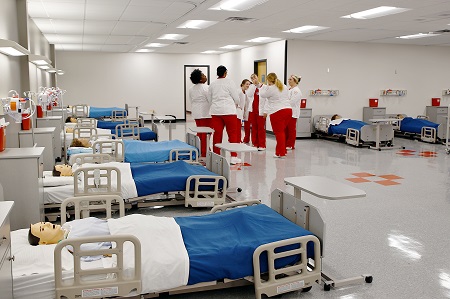
The Mississippi Workforce Enhancement Training (WET) Fund provides noncredit employee
training in priority occupations. EMCC provided training to 1,220 people in programs
supported by WET Funds in 2023, with each of those people enrolling in an average
of 1.4 trainings, for a total 1,694 trainings completed. The top five training areas
were safety, welding/soldering, industrial production, basic skills and supervisory/leadership.
“If one of our local industries has a need for specific skills for their employees,
we will work with them to develop a training program to meet that need,” EMCC Vice
President of Career-Technical and Workforce Education Dr. Michael Busby said. “We
can also provide industry specific preemployment training.”
In a separate study, the Mississippi Association of Community Colleges also commissioned
NSPARC to analyze the combined economic contributions of all 15 Mississippi public
community colleges to the state’s economy.
The statewide results were similar to those found at EMCC.
“The majority of graduates remain in Mississippi, with over 84 percent either securing
employment or continuing their education at a Mississippi public postsecondary institution,”
according to that study.
With more than 6,000 combined full-time employees and 2,000 part-time employees, the
state’s community colleges enroll about 88,000 students annually at campuses and satellites
serving each of the state’s 82 counties. The study found that for each job at a community
college, one additional job was created in the state’s economy.
“Community colleges’ operations paid $455 million in salaries, wages, and fringe benefits
directly to college employees and generated an estimated additional $1.6 billion in
annual earnings throughout the broader economy,” the report states. “In total, every
dollar paid to a community college employee resulted in approximately $3.50 in additional
earnings statewide.”
Students at the colleges spent an estimated $565 million that supported the communities
in which they reside.
In the 2024 academic year, Mississippi’s community colleges awarded a total of 20,052
certificates and degrees. Community college graduates employed in Mississippi earned
approximately $35,116 in their first year of employment after graduation, which is
more than double the first-year wage of $15,920 for noncollege-bound high school graduates.
The median annual salary for community college graduates with an Associate of Applied
Science degree five years after earning their degrees was $51,767.
The combined economic impact is significant.
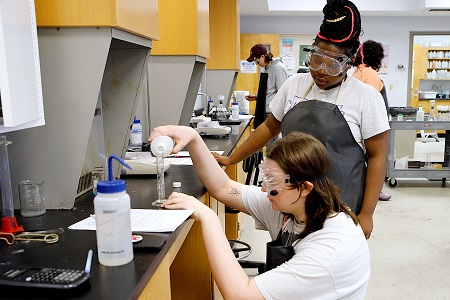 “The model results show that, in 2023, Mississippi community colleges directly and
indirectly generated $2 billion in wages and salaries and $243 million in state and
local tax revenue, through their operations and the students they served,” according
to the report.
“The model results show that, in 2023, Mississippi community colleges directly and
indirectly generated $2 billion in wages and salaries and $243 million in state and
local tax revenue, through their operations and the students they served,” according
to the report.
Nearly 27,000 people received WET Fund non-credit training at Mississippi’s community
colleges in 2023, with completers experiencing an average wage increase of $6,000
annually. The training and associated jobs generated an estimated $16.5 million in
state and local tax revenues, the report states.
“Mississippi’s community colleges have long held a well-earned reputation for providing
students with a quality education at an affordable price,” Mississippi Community College
Board Executive Director Kell Smith said. “Additionally, our community colleges are
a critical component of workforce development statewide and in the regions they serve.
Community colleges provide our residents with an on-ramp to well-paying jobs, while
generating critical revenues that fund community services offered by cities and counties.
Importantly, by offering training in careers that are in demand locally, Mississippi’s
community colleges provide an option for those looking to work and live in the communities
in which they reside. In turn, that supports the workforce needs of our local businesses
and industries, as well as those of new industries considering locating to our state.”

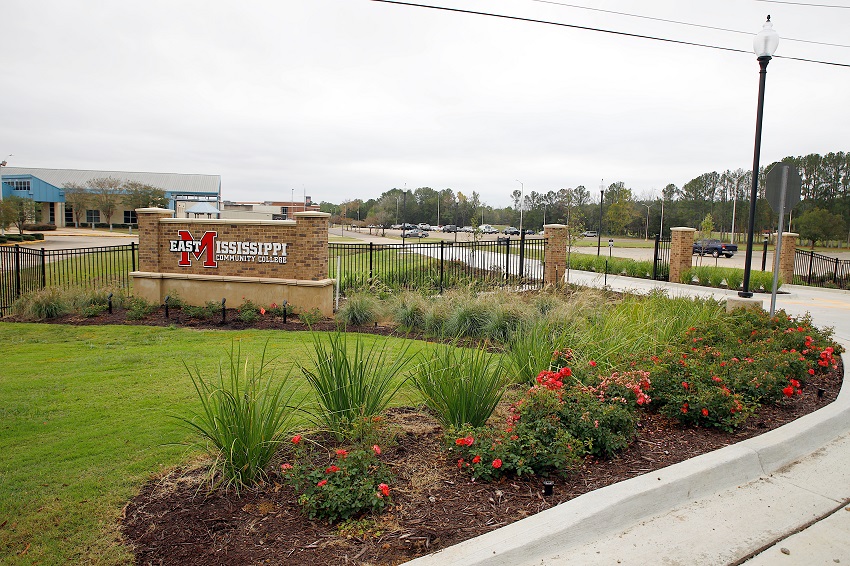

 During the 2024 academic year, EMCC awarded a total of 921 certificates and degrees.
Of those, 478 were Associate of Art degrees, with 208 Associate of Applied Science
degrees awarded and 235 students earning one-year certificates.
During the 2024 academic year, EMCC awarded a total of 921 certificates and degrees.
Of those, 478 were Associate of Art degrees, with 208 Associate of Applied Science
degrees awarded and 235 students earning one-year certificates.
 “The model results show that, in 2023, Mississippi community colleges directly and
indirectly generated $2 billion in wages and salaries and $243 million in state and
local tax revenue, through their operations and the students they served,” according
to the report.
“The model results show that, in 2023, Mississippi community colleges directly and
indirectly generated $2 billion in wages and salaries and $243 million in state and
local tax revenue, through their operations and the students they served,” according
to the report.
 Visit a Campus
Visit a Campus






